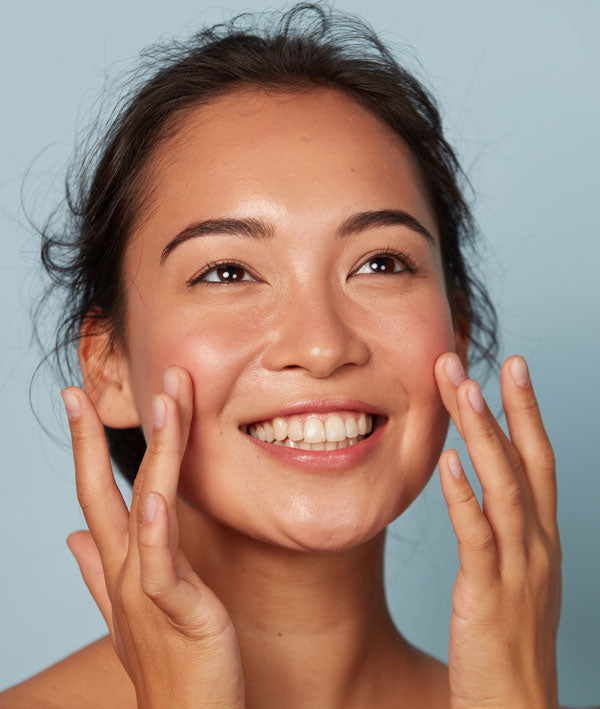Summer is just around the corner! In between making vacation plans and dreaming about spending days out in the sun, it’s a good idea to start thinking about how your skin may be affected by the changes in weather.
If you have acne-prone skin, listen up. Factors like heat and humidity can increase your risk of breakouts, which means you’ll need to adapt your routine and implement a few key lifestyle changes to treat and prevent summer breakouts. In this guide, we’ll cover six things you need to do to keep your complexion clear, radiant, and healthy all summer long.
How Does Skin Change In The Summer?
Unfortunately, when you combine hot temperatures and excess sweat (and humidity, depending on your location), you’ve created the ideal breeding ground for acne. Dead skin cells, bacteria, excess sebum, and other debris is more likely to get trapped into the pores, leading to breakouts.
Beyond acne, there are other ways in which the summer weather can impact your skin. If you live in a drier climate, you may notice your skin feeling rough and dehydrated. Additionally, with increased sun exposure, there is a higher risk of sun damage. This makes it especially important to stay on top of your sunscreen application!
Now that you know how your skin may change in the summer, let’s discuss how you can adapt your routine.
1. Switch To A Lightweight Moisturizer
If you’re still using a rich moisturizer, it is time to swap it out for a lighter formula. You’ll still want to continue using a moisturizer day and night to keep your skin soft and supple. However, with the hotter temperatures, a thicker formula will often feel too heavy on the skin, and may even contribute to breakouts. We recommend seeking out a gel or gel-cream based moisturizer, which will be able to keep your skin moisturized and healthy without creating a greasy layer.
2. Choose Oil-Free Products
Similarly, you’re going to want to use oil-free skincare products in your routine, as they’ll feel lighter on the skin and will be less likely to clog pores. This is especially true when it comes to sunscreens.
Many people with acne-prone skin are hesitant about applying sunscreen, as they’re worried about it contributing to breakouts. However, an oil-free sunscreen (especially one made specifically for complexions prone to breakouts) will have a much lower risk of causing blemishes – and will ensure you stay adequately protected against harmful UV rays.
3. Avoid Touching Your Face
Touching your face is always a no-go for anyone that deals with breakouts, but it becomes even more of an issue in the summer. As mentioned, when you’re battling sweltering temperatures, there’s already a higher risk of impurities getting trapped in the pores. When you touch your face, you’ll likely end up spreading even more pore-clogging debris to your skin – which means more breakouts. If you do need to touch your face (such as when you’re reapplying sunscreen), make sure you wash your hands first.
4. Incorporate Serums Into Your Routine
If you aren’t already, this is the perfect time to work lightweight serums into your routine to target specific concerns and enhance overall skin health. A vitamin C serum (like the Vitamin C Boost Serum) is a good idea year-round, but it’s especially great in the summer.
Vitamin C is an antioxidant that can protect the skin against the harmful effects of free radicals, which can damage the skin. It also provides anti-aging benefits, and can brighten the skin to reduce the appearance of hyperpigmentation – which can be particularly helpful if you are prone to dark marks after a blemish has healed.
Beyond that, we also recommend trying a hyaluronic acid serum, like the Hyaluronic Pure Boost Serum (which has a lightweight formula that is suitable for all skin types). This type of serum can be especially helpful for those living in a dry climate. Hyaluronic acid draws water to the skin, helping to counteract dehydration and soften the complexion for optimal comfort and skin health.
5. Use Clean Towels & Pillowcases
It’s not fun to think about, but your towels and pillowcases can harbor contaminants like sweat, bacteria, dirt, body lotion, and hair products – all of which can clog the pores. In order to maintain a clear complexion this summer, we recommend cleaning or switching out your towels and pillowcases every two to three days. While it may be a bit of a hassle, it can do wonders for preventing breakouts.
6. Exfoliate More Often
Since there’s a higher risk of excess sebum, dead skin cells, and other impurities building up on the skin and in the pores, you’re going to want to make sure you’re exfoliating regularly. A good exfoliant will help clear away this debris to diminish current breakouts and prevent acne from forming in the first place. Formulas made with salicylic acid are especially helpful. This oil-soluble chemical exfoliant works deep in the pores to decongest and get rid of pore-clogging impurities, helping to keep the skin clear.







